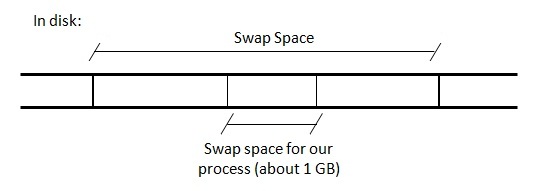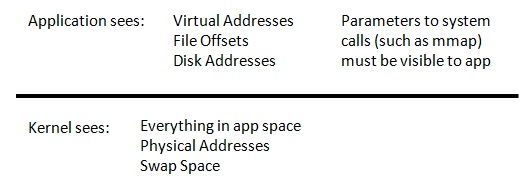CS111 - Lecture 15
2012-05-24
Table of Contents
Process Virtual Space
The page table could take up too much room (recall: 4MB / process)

There is a large gap in virtual space
The page table contains a lot of unused space
- Large area filled with all zeroes
- Like sparse file problem in Unix file system
lseek(fd, 100000000000000, SEEK_CUR);
write(fd, "x", 1);
It doesn't actually allocate all of this memory, only uses empty indirect blocks
We can apply this concept to page tables:
Multi-Level Page Table

x86: 2 level page table
Virtual Address: 10 bit high part, 10 bit low part, 12 bit offset
+------------------------+------------------------+----------------------+| high part (10) | low part (10) | offset (12) |
+------------------------+------------------------+----------------------+
| Virtual page # | |
{
// "pmap" really built into hardware
int lo = vpn & ((1 << 10) - 1);
int *lopage = PAGE_TABLE[hi];
if(!lopage)
return FAULT;
return lopage[lo];
}
Page Faulting Process
(unusual case in memory references)
- trap
-
kernel gets control
-
Something useful must happen here
possibilities:- terminate the process (big exit status)
-
send a signal to the process
SIGSEGV (SIGnal for SEGmentation Violation) - we need to bring a page in from disk
- RETI
-
Something useful must happen here
// Go into signal handler
{
set (global variable) i to something else
If i is global, the program may use a version of i cached in a register, if used in many places
This won't work ... unless i is volatile
}
Bourne shell (/bin/sh)

int stacksize;
stack = malloc_special(stacksize);
{
"realloc"(stack, stacksize *= 2);
Low-level memory allocation
mmap(lots of parameters) system call:
- Alters page table in a controlled way
- "I'd like memory locations 0x1000000 to 0x1800000 to correspond to the contents of this fd"
- Specify file descriptor, location, size, and flags (e.g. rwx)
When try to access this, page fault, file is brought to this location
Can do I/O without reads or writes
Most common file to mmap is /dev/zero (reads all zeroes, writes ignored)
Can create new memory, initialized to zero
Bad design if there is an actual segfault (ok for Steve Bourne (maybe), not for the rest of us)
Page Faults
The kernel must deal with page faults

{
// access_type is read, write, or execute (rwx)
// cp is current process
if(swapmap(cp, va) == FAIL)
else
{
// vva is victim's virtual process
physaddr = vp->pmap(vva);
// modify victim process' page table
// modify current process' page table
}
}
Page faults require read from and write to secondary storage (20-30 ms on hard disk)
We want to avoid page faults as much as possible
Page Removal
Q: What if page that holds pfault gets paged out?
A: Don't do that!
The removal policy is tricky, need to be careful which page to remove...

What is the best way to do I/O to disk?
- A. open, (read, compute, write)*, close
- B. open, mmap, compute, close
B seems more simple, why not do it?
-
Your VM subsystem must be smart
- Needs to know which pages should be victims
(e.g. when read/write pointers move through a file)
- Needs to know which pages should be victims
Policy: which page will be the victim?
If pages are accessed at random (the 'R' in "RAM" does stand for Random), then choose a page at random! However, the principle of locality of reference applies and we want to exploit this.
Page Replacement Policies
Assume 5 virtual pages (0-4), 3 physical pages (A-C)
Reference string is a sequence of virtual page #'s (VPNs)
| 0 | 1 | 2 | 3 | 0 | 1 | 4 | 0 | 1 | 2 | 3 | 4 |
empty entries are garbage
yellow highlighted entries are page faults
| FIFO policy | |||||||||||||
|---|---|---|---|---|---|---|---|---|---|---|---|---|---|
| 0 | 1 | 2 | 3 | 0 | 1 | 4 | 0 | 1 | 2 | 3 | 4 | ||
| A | 0 | 0 | 0 | 3 | 3 | 3 | 4 | 4 | 4 | 4 | 4 | 4 | |
| B | 1 | 1 | 1 | 0 | 0 | 0 | 0 | 0 | 2 | 2 | 2 | ||
| C | 2 | 2 | 2 | 1 | 1 | 1 | 1 | 1 | 3 | 3 | |||
9 faults |
|||||||||||||
What if we get another page of physical memory?
| FIFO policy with another page of physical memory | |||||||||||||
|---|---|---|---|---|---|---|---|---|---|---|---|---|---|
| 0 | 1 | 2 | 3 | 0 | 1 | 4 | 0 | 1 | 2 | 3 | 4 | ||
| A | 0 | 0 | 0 | 0 | 0 | 0 | 4 | 4 | 4 | 4 | 3 | 3 | |
| B | 1 | 1 | 1 | 1 | 1 | 1 | 0 | 0 | 0 | 0 | 4 | ||
| C | 2 | 2 | 2 | 2 | 2 | 2 | 1 | 1 | 1 | 1 | |||
| D | 3 | 3 | 3 | 3 | 3 | 3 | 2 | 2 | 2 | ||||
10 faults! |
|||||||||||||
Belady's Anomaly: adding RAM can hurt performance (it usually doesn't)
| LRU (Least Recently Used) | |||||||||||||
|---|---|---|---|---|---|---|---|---|---|---|---|---|---|
| 0 | 1 | 2 | 3 | 0 | 1 | 4 | 0 | 1 | 2 | 3 | 4 | ||
| A | 0 | 0 | 0 | 3 | 3 | 3 | 4 | 4 | 4 | 2 | 2 | 2 | |
| B | 1 | 1 | 1 | 0 | 0 | 0 | 0 | 0 | 0 | 3 | 3 | ||
| C | 2 | 2 | 2 | 1 | 1 | 1 | 1 | 1 | 1 | 4 | |||
10 faults! |
|||||||||||||
Note: In practice (not for this contrived example), LRU is better than FIFO
| Optimal policy: consult an oracle and find the page least needed in the future | |||||||||||||
|---|---|---|---|---|---|---|---|---|---|---|---|---|---|
| 0 | 1 | 2 | 3 | 0 | 1 | 4 | 0 | 1 | 2 | 3 | 4 | ||
| A | 0 | 0 | 0 | 0 | 0 | 0 | 0 | 0 | 0 | 2 | 3 | 3 | |
| B | 1 | 1 | 1 | 1 | 1 | 1 | 1 | 1 | 1 | 1 | 1 | ||
| C | 2 | 3 | 3 | 3 | 4 | 4 | 4 | 4 | 4 | 4 | |||
7 faults |
|||||||||||||
You can run the program, get reference string, and use this for the next execution.
More generally, get statistics from previous reference strings to approximate oracle.
Use Virtual Memory to Shrink Wait Time for Running a Program
- Copy program into RAM
- ip = start of file (running)
Step 1 takes a long time, so instead:
Demand Paging:
-
mmap from file to virtual memory
we have not read/written into memory - just set up the page table -
ip = start (virtual address)
automatic page fault, and get the file through the first page fault
Faster to copy one page than entire program
- + start up faster
- - total cost of loading increases (bring in one page at a time)
Optimizations
Dirty Bit
The dirty bit records for each page whether it has been modified since it was read in. If dirty bit is clear, no need to write out to disk. Some hardware does this for you. Otherwise, can do this in software.
When you bring a page in:
- tell hardware it's read-only
- the first access traps and the kernel sets the dirty bit